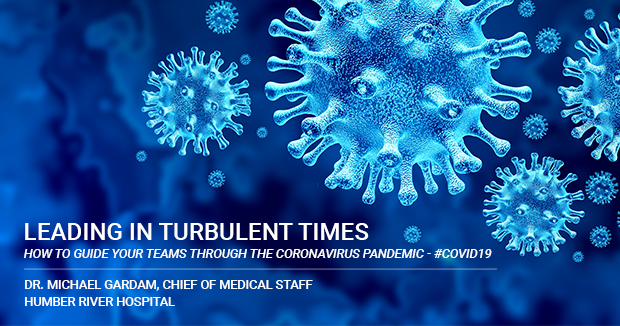On March 19, 2020, the Canadian College of Health Leaders hosted a webinar with Dr. Michael Gardam, Chief of Staff at Humber River Hospital, and an infectious disease physician and expert. Dr. Gardam, in conversation with Brenda Lammi, Vice-President, Professional and Leadership Development at CCHL, discussed effective strategies that health leaders can apply directly to their work.
The following are Brenda Lammi’s personal take-aways and key points from her dialogue with Dr. Michael Gardam.
Leading in Turbulent Times – How to Guide your Teams Through the Coronavirus Pandemic
Lead Self
It is essential to carve out time for yourself during this turbulent time. We need to let go of the ‘hero leader’ mentality and build a team of competent leaders who can take turns leading and following and taking time to recharge.
We talk about the need for leaders to clearly define their values, as these will help them navigate the volatile, uncertain, complex, and ambiguous (VUCA) world of healthcare. This has never been truer than now. Dr. Gardam emphasized the values of honesty, authenticity, and transparency – being clear about what you know and what you don’t know, communicating this to your team, and being able to shift priorities and pivot as new information emerges.
Engage Others
There are many, many, many sources of information coming at leaders – in multiple formats, for multiple reasons. It is essential to ‘eliminate the noise’ as a leader and select the channels to which you will give your attention, as you can’t read and respond to everything. It is also crucial for system-wide effectiveness and for mitigating anxiety based on conflicting information (some of which may be unsubstantiated) that leaders communicate clearly with their teams and keep everyone focused on the most reliable information.
To support your teams, making daily efforts to connect in a way that is meaningful and within your scope of availability. If you can’t do it in person, then via text, email, or other messaging options. Being mindful of the tone challenges in written communication and being careful to not be too blunt in messages are important, as well as including the personal elements that you would do in person… despite limited time.
The healthcare system is very focussed on the physical safety of employees at this time – there is a need to add the psychological safety and well-being of healthcare workers as a priority within in the system.
Achieve Results
It is time to refocus and define the immediate priorities and results that you are striving to achieve during the pandemic, especially during its early stages. Setting these immediate priorities will enable you to focus your energy and teams amid multiple important priorities.
In typical times, there is a shift to distributed leadership. Given the turbulence of the pandemic, there is a need to shift to a ‘command and control’ form of leadership. This will promote one source/funnel of relevant information and ensure that everyone is working in collaboration for the same purpose, with the same goals, and with a shared knowledge of operational or execution procedures and protocols to maximize efficiency. There remains, however, a trust and enablement within teams, to ensure that there is an appropriate degree of autonomy, turn-taking, and that a diversity of skills is being directed toward organizational priorities.
Develop Coalitions
During SARS, organizations tended not to reach out and collaborate or communicate with each other. With COVID-19, there are multiple organizations communicating and collaborating – at multiple levels – which may or may not be helpful given the multitudes of layers (community organizations, municipal, provincial, federal governments). Dr. Gardam emphasized the need to funnel information and prioritize the partnerships for your own organization.
Systems Transformation
A lot was learned and said following SARS with some changes made, but not enough and not in a sustained manner, as the health system was not prepared for this pandemic. While navigating the current emergency, let’s plan to learn what we can and ensure we are ready if and when this happens again.
The webinar with Dr. Michael Gardam, “Leading in turbulent times – how to guide your teams through the Coronavirus pandemic”, is available online. View the video here.



